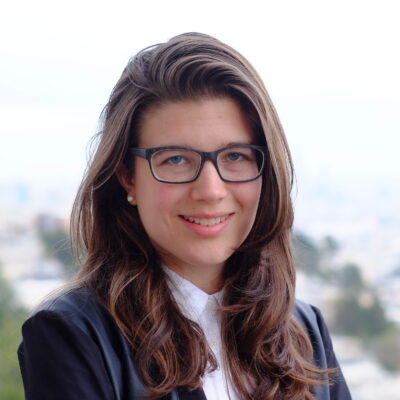How one Junior Faculty Fellow aims to advance engineering research
BY: NATALIE GOLD
Boston native Emma Lejeune has found herself back in the area, starting a new lab for her group to advance computationally-driven research. Now a Junior Faculty Fellow at the Hariri Institute, Lejeune aims to advance research as both a mentor and an advocate for open-source data and software.
Lejeune’s interest in engineering sprang from a desire to impact the world. “Just the idea of being an engineer, especially getting to work on projects that would have a tangible impact on the world was really compelling to me,” said Lejeune. Seeing the promise of computational work during her initial experiences with undergraduate research, Lejeune pursued a focus on computational methods in graduate school. Now, she enjoys working with students who share her passion for the impact that computational methods can have across a range of fascinating application spaces.
Drawing on experience as an undergraduate, graduate student, and postdoctoral researcher, her prior endeavors have informed how she tries to mentor her students at Boston University. Pulling together her first independent research project in graduate school was challenging. “Initially, I felt like I was working really, really hard but had nothing to show for it,” she said. Lejeune hopes to minimize similar feelings of uncertainty in her students, and works to remind them that finishing a first project is a major milestone.
Lejeune also strives to champion her students’ research ideas from their conception to completion. Her mentorship strategy begins with helping students work through their first projects to become efficient, independent researchers. The students in the Lejeune lab are investigating new methods to link physics-based and data driven modeling approaches alongside building our understanding of multiscale emergent behaviors in biological systems.
She also works to advance engineering research by advocating for open-source data and software. Lejeune is currently working on a series of projects where she makes mechanical data sets freely available online, inviting a broad audience to get involved and test out their own research ideas. Even in these times of physical separation, open-source data and software allow for connection and collaboration, lowering the barriers to trying new approaches.
In particular, open-source data and software make it more likely that a problem will be solved quickly. “I’m not necessarily going to be the person who develops the best algorithm. It could hypothetically be anyone in the world,” said Lejeune. But other researchers will have a much easier time making breakthroughs if they have easy access to previous work.
Research advancement is supported by people willing to foster innovation and collaboration. Lejeune knows this, and works with her group to advance engineering research in any way that she can. “This way, we’re a piece of a much bigger project,” she said.
Interested in learning more about the transformational science happening at the Hariri Institute? Sign up for our newsletter here.
